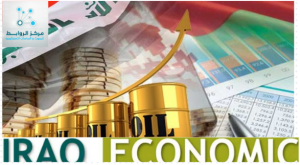BY Shatha Kalel
Prime Minister Mohammed Shia al-Sudani’s government faces challenges , Given Iraq’s heavy reliance on oil exports, its GDP performance will closely track oil market movements from 2024 to 2028, with economic growth weakening as oil prices fall and output growth slows.
The World Bank is actively involved in supporting Iraq’s efforts to stabilize its economy, improve governance, and rebuild livelihoods. This is crucial for a country where oil revenues have historically accounted for more than 99% of exports, 85% of the government budget, and 42% of GDP. Such dependence on oil exposes Iraq to macroeconomic volatility and limits its fiscal flexibility.
Iraq’s economy is recovering from the dual shocks of the oil price collapse and the COVID-19 pandemic in 2020. In 2021, real GDP grew by 1.3% after an 11.3% contraction in 2020. This recovery was driven by increased oil production and the easing of COVID-19 restrictions, which boosted domestic economic activity. The non-oil economy grew by over 6% in the first nine months of 2021, reflecting strong performance in the services sector.
Government revenues surged by 73% year-over-year in 2021 due to higher oil prices, which averaged $68.3 per barrel. Improved oil receipts and a devalued currency contributed to turning the fiscal balance to a surplus of 5.3% of GDP. However, Iraq’s economic conditions are still plagued by structural issues, such as public investment management constraints, a weak healthcare system, and rampant corruption.
The turnaround in oil markets has significantly improved Iraq’s medium-term economic outlook. Growth in 2022 was forecast at 8.9% as OPEC+ quotas ended, and Iraq’s production surpassed pre-pandemic levels. However, growth is expected to average only 3.7% in the following years as oil production moderates. Non-oil GDP growth is projected to converge to its long-term potential, partly due to higher investments financed by oil revenues.
Despite the improved fiscal and external balances, Iraq faces significant risks. Geopolitical tensions, particularly the war in Ukraine, pose risks to Iraq’s economy. Rising food prices and disruptions to agricultural imports exacerbate poverty and food security risks. Furthermore, Iraq’s rapid population growth necessitates higher economic growth to improve welfare outcomes and close the income gap with peers.
In early 2023, Iraq’s GDP growth slowed to 2.6% due to new crude oil production limits. Inflation ticked up due to the depreciation of the Iraqi dinar, highlighting persistent exchange rate pressures. Fiscal and external account balances, which benefitted from the oil windfall in 2022, began to moderate as oil prices softened.
The recently ratified 2023-2025 budget is excessively expansionary and lacks structural reforms needed for sustainable development. The budget, heavily skewed toward recurrent spending, assumes an oil price of $70 per barrel, but the breakeven price is actually $112 per barrel. This fiscal approach could lead to rapid depletion of reserves accumulated during the 2021-2022 oil boom and renewed fiscal pressures.
Iraq’s economic outlook continues to hinge on oil sector developments. Overall GDP is forecast to contract by 1.1% in 2023, driven by a projected 4.4% contraction in oil GDP. Non-oil GDP growth is expected to accelerate, partly assisted by budget expansion. However, the limited linkage between oil and non-oil sectors, coupled with public sector dominance, constrains long-term economic growth.
The high dependence on oil leaves Iraq vulnerable to market shocks and global demand fluctuations. Pre-existing fragilities, including corruption, low labor force participation, and poor service delivery, remain key challenges. Furthermore, climate change and commodity price volatility pose additional risks.
Financial sector reforms are crucial for economic diversification and job creation. Iraq’s banking sector is dominated by undercapitalized state-owned banks, and the private commercial banking sector lacks capacity. Enhancing financial intermediation and promoting financial inclusion are essential for restoring public confidence and mobilizing Iraq’s wealth to address its development challenges.
In summary, Iraq’s economic stability is precarious and highly dependent on oil market dynamics. Without serious political and economic reforms, any progress in stability could be short-lived. Sustainable economic development requires a long-term approach to diversify the economy and address structural challenges.
Economic Studies Unit / North America Office
Rawabet Center for Research and Strategic Studie

